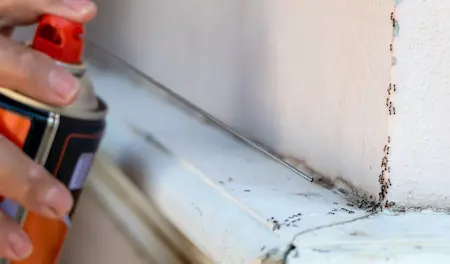
Ants are common household pests, and keeping them out can feel like a lifelong challenge. Whether they’re crawling into your kitchen, bathroom, or backyard, these determined pests are drawn to areas that offer food and shelter. While ant sprays are a popular choice for quick relief, do they truly stop ants from coming back? In this article, we’ll dive into how ant sprays function, assess their effectiveness in managing infestations, and share essential safety tips for using them in your home.
What Makes Ant Spray Work?
To determine how effective ant sprays are, it’s important to understand the key ingredients they contain. These products typically feature active compounds designed to either kill ants on contact or create a barrier that repels them. Common active ingredients include:
- Pyrethroids: Man-made chemicals that replicate natural insecticides found in chrysanthemum flowers. They target the ants’ nervous systems, causing paralysis and death.
- Neonicotinoids: Compounds that interfere with the ants’ nervous systems, ultimately leading to their demise. While highly effective, they have raised concerns about their environmental impact.
- Essential Oils: Some sprays rely on natural ingredients like peppermint, clove, or citrus oils to deter ants. These are generally safer for household use but may be less effective against larger infestations.
When applied, these sprays form a toxic or repellent barrier. Ants that come into contact with it are either killed or discouraged from crossing. The effectiveness of the spray can vary depending on factors such as the ant species, the severity of the infestation, and how thoroughly the product is applied.
Is This a Long-Term Solution?
Ant sprays offer fast results, typically killing ants instantly when applied directly onto them or their trails. This provides immediate relief and significantly reduces their presence in your home.
However, despite their quick action, ant sprays are generally a short-term solution. While they can kill and repel ants, they don’t tackle the root cause of the infestation. Unless the entire colony—especially the queen—is eliminated, ants will keep coming back, creating a cycle that never ends.
For long-lasting ant control, try these effective methods:
- Seal Entry Points: Identify and seal any cracks, gaps, or openings where ants could be entering your home.
- Remove Food Sources: Keep your kitchen tidy, store food in sealed containers, and clean up crumbs and spills promptly.
- Use Ant Baits: Baits offer a more permanent solution by attracting ants to carry poisoned food back to their colony, targeting the queen, and reducing the overall population.
If the infestation becomes too much to handle, our experts at Griffin Pest Solutions are ready to provide customized, professional ant control services to help protect your home.
Need a Pest Control Estimate?
Can Babies and Pets be Near Ant Sprays?
When using ant sprays, you need to be aware of the risks, especially in homes with children or pets. Many traditional sprays contain chemicals that can be hazardous if inhaled or ingested. To help minimize potential risks, follow these essential safety guidelines:
Read Labels Carefully:
Always review product labels and follow the instructions exactly. Choose sprays that are clearly marked as safe for use around children and pets.
Consider Natural Options:
Natural or non-toxic sprays, often formulated with essential oils, can be a safer choice. Although they may require more frequent applications, they are generally more suitable for households with young kids and pets.
Apply with Precaution:
Use sprays only in areas inaccessible to children and pets. Avoid applying them near toys, food dishes, or bedding. After spraying, ensure the area is well-ventilated and allow the product to dry completely before allowing kids or pets back into the space.
If ant issues persist or you need professional advice on the safest pest control solutions, the experts at Griffin Pest Solutions are ready to assist with customized treatments to keep your home pest-free.
Why Does Ant Spray Stop Working?
Handling ants can be extremely frustrating, especially when they’re persistent. Even after applying sprays, they often come back. Here’s why:
Concealed Nests:
Ant colonies are usually hidden in hard-to-reach spots, such as inside walls, under floors, or around the foundation of your home. Sprays only kill the ants you can see, which are just a small part of the colony. The rest will quickly send out reinforcements to replace them.
Multiple Nest Locations:
Some ant species have several interconnected colonies. Eliminating one nest won’t stop others from thriving, creating an ongoing problem of infestations.
Pheromone Trails:
Ants leave behind chemical scent trails, known as pheromones, to lead other ants to food sources. If these trails aren’t completely wiped out, new ants will keep following the same path into your home, allowing the infestation to persist.
Professional Advice from Griffin Pest Solutions
Ant sprays may offer immediate relief from ant problems, but they aren’t a permanent fix for long-term control. Safety should always be a top concern, especially in homes with children or pets. Simply applying more spray or using it more often won’t address the root cause of the infestation, and prolonged use could lead to health risks.
If ants persist, it’s time to seek professional help. Our experienced pest control specialists can create a customized treatment plan to effectively resolve the issue. When the infestation becomes too much to handle, don’t hesitate to contact us—we’re here to guide you through the process.
Back to Ant Exterminators – Control – Removal
